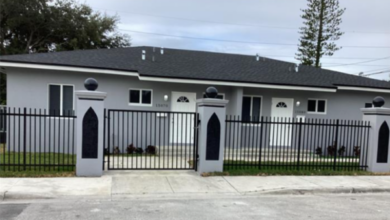After successful elections, Haiti now faces ‘Moment Of Truth’ in push towards full democracy and lasting development
Interim Prime Minister, Briefing Council, Says Country Will Need Help in Building Institutions for Years to Come
WASHINGTON, DC – Applauding the Haitian people for their patience and continuing commitment to democracy, the United Nations Security Council today congratulated René Préval on his victory in the Caribbean country’s recent presidential election.
Giving the Council first-hand information on the 7 February ballot, Mr. Latortue said he would also “correct some wrong impressions” created in the international press, which had often missed the real and thorough change taking place in Haiti, especially during the last two years of transition. “To the great surprise of the world, Haitians showed their confidence in the democratic process,” he said, thanking the Council for its continuous support for Haiti, as well as those countries that had provided troops and police.
With Haiti’s transition complete, the moment of truth had come, he said. The main task for the Transitional Government had been to organize free, honest, democratic, transparent and inclusive elections. With the outcome of the election exceeding expectations, that mission had been accomplished. And, while there had been many threats to the holding of the elections, including organizational and institutional problems, as well as security concerns, fortunately, the United Nations Stabilization Mission in Haiti (MINUSTAH) had done a wonderful job.
Thanks to cooperation with the national police, the security environment had made it possible for people to vote in large numbers. They had done so, because of their trust in the Transitional Government, which had, on many occasions, reaffirmed its neutrality vis-à-vis the electoral process. Haitians had known that their vote would count and that there would be no attempt on the part of the Government to manipulate their will, he said.
The results had exceeded all expectations, with a voter turn out of some 65 per cent — a percentage rarely achieved, even in countries with a long democratic tradition. Haitians recognized that the only way to bring about change was to vote, and that the only weapon in that regard, was the ballot.
The ballot had taken place smoothly, with only a small delay at the start of operations, he continued. Voting centres had opened at around 8:30 a.m., rather than 6 a.m. as planned. Haitian voters had demonstrated great patience, with many people walking for two hours to arrive at election centres by 5 a.m., only finding that they had to wait several hours.
But, he acknowledged that a desire for transparency in organizing the elections had almost led to a lack of understanding on the part of the people, he said. Using advanced technology for the first time, the Provisional Electoral Council had decided not to announce the results of the election, until all the ballots had been counted. It had, however, provided partial results, beginning in Port-au-Prince.
There, René Garcia Préval was unquestionably the most popular candidate, receiving some 85 per cent of the vote. Moving away from the city, however, that percentage lowered, which, combined with the delay in announcing the outcome, had created a problem. Some believed the extra time used to call the election had been an attempt to steal Mr. Préval’s victory. Things had almost turned sour. Fortunately, a formula had been found, making it possible to share the results.
Another issue was that of blank ballots, he said. Haiti’s Constitution demanded that all blank votes be counted, without specifying how. The blank ballot was the expression of a sophisticated voter, who wanted to express rejection. In the end, the results had been announced, with former President René Garcia Préval, having received some 51.2 per cent of the votes cast, declared the winner. The choice of the Haitian people had been clear, and the President-elect would be sworn in on 29 March.
The overall exercise was a way of showing, symbolically, that Haiti was returning to constitutional order. With that in mind, he invited the Council to Port-au-Prince to celebrate this victory for democracy when the next ballot was held. Such a visit would be an important sign of the Council’s support for democracy and the democratic process.
But, democracy was more than the simple holding of elections — it was the establishment of institutions, he said, and Haiti would need the help of the international community in that area for some years to come. The international community must not make the same mistake it made a decade ago, by leaving Haiti shortly after elections had been held. He praised the Council’s renewal of MINUSTAH’s mandate, and looked forward to assistance in other areas, such as administrative training and judicial reform. It also needed help improving its national police force.
The Transitional Government had taken significant steps in improving the socio-economic situation in the country, but the new Government would need the support of the international community in that area as well. He had been heartened by recent meetings with the Bretton Woods institutions, at which the participants seemed to understand, and agree, that democracy in Haiti would need to be supported for some time to come.
He also stressed the need for coordination on the development front. Everyone must make a real effort to avoid a proliferation of “lots of different little projects scattered all over the place”. He also stressed that what Haiti needed now was less military personnel and more engineers, more men and women dedicated to jumpstarting economic and social development, and ending poverty, unemployment and social inequality.


